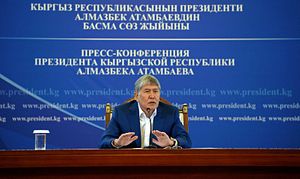In a 3.5 hour press conference Monday, Kyrgyz President Almazbek Atambayev answered questions from journalists on a wide array of topics, from the country’s upcoming election to what he was doing on May 13, 2010; from discussions of the long-stalled China-Kyrgyzstan-Uzbekistan railway to the fate of the Bakiyevs.
Both 24.kg and Kloop compiled lists of the most interesting comments made by Atambayev, which provided insight on issues, both old and new, that plague Kyrgyzstan.
The first question asked related to the recent news that a Czech company, Liglass Trading, was taking over RusHydro’s stake on several hydropower projects, most prominently the Naryn Cascade. As Bruce Pannier outlined in his article about the kerfuffle, regional media reported that the Czech company was “unknown” and cast doubt on how it had been lined up to replace the Russians.
The Upper Naryn cascade and another hydropower project, Kambar-Ata-1, has been a nightmare project for Kyrgyzstan. The benefits would be huge but Bishkek lacks the funds to complete the projects on its own. In late 2004, RusHydro signed on to be Kyrgyzstan’s partner and in 2009, then-President Kurmanbek Bakiyev, “announced Russia was providing Kyrgyzstan with a $450-million loan and would later extend an additional $1.7 billion for construction of Kambar-Ata-1.” But, as Pannier notes, the president’s son was given lead on the project and reportedly siphoned funds to other projects first.
In December 2015, Atambayev lamented in his year-end remarks about uncompleted construction projects and stated that Russia was unable to fulfill its financing of the Upper Naryn cascade project. Kyrgyzstan terminated its agreement with RusHydro in order to court other partners. At the press conference, Atambayev said he made the right decision to terminate the agreement with RusHydro and praised his decision to settle an agreement with Liglass Trading, saying, “The agreement is good. It is absolutely successful for Kyrgyzstan.” But, if Liglass doesn’t buy out RusHydro by September — to the tune of $37 million — “then we will look for another investor.”
Another hot topic, especially in a room of about 70 journalists, was Atambayev’s dogged pursuit of media companies — especially Zanoza.kg — for defamation and libel. Atambayev offered a bit of a backhanded compliment to the press, calling it “toothy” but also noted that the cases against Zanoza would not be dropped. “These slanderers dishonor Kyrgyz journalism. Is it my fault that they publish libel?” he said. Atambayev referred to the defamation cases as a “lesson.”
One of Atambayev’s more colorful comments was about the Bakiyev family. Specifically, Atambayev said it was a pity that there was no Kyrgyz Mossad, “otherwise Janish Bakiyev would be found and punished.” Mossad is Israel’s national intelligence agency, tasked with, among other things, covert operations like assassinations. Janish Bakiyev is former President Kurmanbek Bakiyev’s brother and former chief of the State Security Service of Kyrgyzstan, who, like his brother, is reportedly holed up in Belarus.
In reference to another Bakiyev, Maxim, Atambayev said he’d get the punishment he deserves and noted an opportunity to do so in London, but wouldn’t say much more, claiming it a “state secret.” Maxim Bakiyev, Kurmanbek’s son, lives in a $4.3 million mansion outside of London.
Atambayev responded to several questions about the October election and his future in politics. He seemed to endorse current prime minister and SDPK’s official candidate, Sooronbay Jeenbekov, saying he trusts him. Atambayev commented on some of SDPK’s apparent internal fracturing, saying that Chinibay Tursunbekov — current speaker of parliament and SDPK member — was disgracing the party by announcing his intentions to run for president as an independent candidate. If Jeenbekov and the SDPK weren’t running, Atambayev said, he’d probably vote for Omurbek Babanov.
There were numerous other topics covered, including a jab at those who push for the adoption of a Latin alphabet (Atambayev is against it), a pseudo-apology for using the word “shit” (Atambayev agrees it’s rough language, but literary), radicalization (“half-wits” who can’t read Arabic and don’t know the Quran) and the usefulness of education in combating it.

































